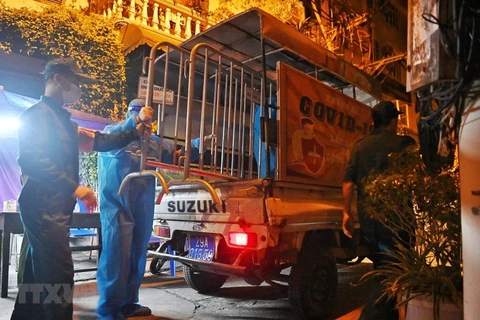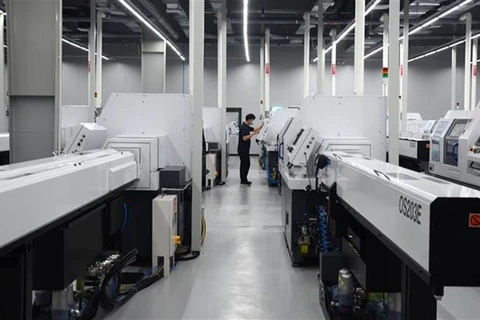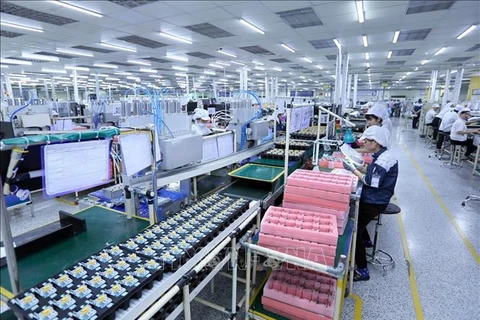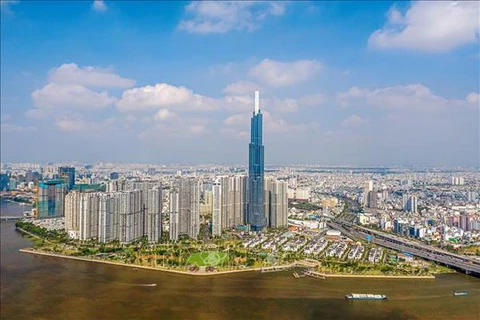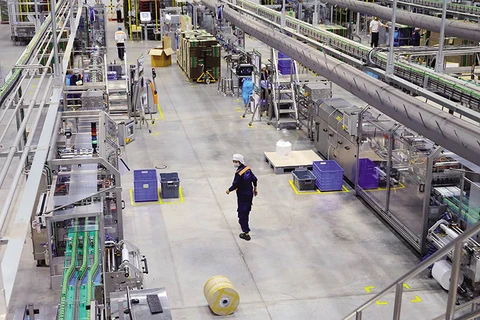
Vietnam begins changing its approach to COVID-19 in the direction of safe and flexible adaptation and effective control. (Photo: VNA)
Hanoi (VNA) – The Ministry of Planning and Investment (MPI) is coordinating with relevant ministries, sectors and localities to research and develop a programme for economic recovery and development in association with improvement to the economy’s internal capacity and self-reliance by 2023.
The Minister of Planning and Investment, Nguyen Chi Dung, revealed the information at a consultation conference on October 1.
The programme aims to realise a goal to achieve an annual average GDP growth rate of 6.5-7 percent during 2021-2025.
Main short-term support policies
According to the minister, Vietnam has been heavily affected by the COVID-19 pandemic, especially in the fourth wave of outbreaks. Economic growth slowed down, up only 1.42 percent in the first nine months of the year.
Production activities, goods circulation, and supply and consumption chains were interrupted or even broken.
The cost of most production industries has been increasing while the economy’s capacity and resilience is decreasing. This has eroded resources of the business community and led to a difficult life for people and workers.
The Government recently issued several policies to support and ease difficulties facing businesses and people, Minister Dung said.
Support policies include both fiscal and monetary ones on taxes, fees, charges, debt freezing and rescheduling, extension of payment dates and reduction of interest rates, and state budget expenditures, totaling about 6.7 billion USD, he noted.
Put together, assistance through other channels, such as the unemployment insurance fund, exemption and reduction of telecommunications, electricity and water charges, and tuition fees, the value of support packages in 2021 is about 10.45 billion USD, equivalent to 2.84 percent of GDP.
However, compared to many countries in the region, such as Thailand (11.4 percent of GDP) and Malaysia (5.3 percent of GDP), this level of support still remains low, Dung said.
Vietnam's recent support policies have mainly solved short-term financial difficulties facing businesses and people. They still lack comprehensive, long-term and synchronous solutions with resources large enough to promote economic recovery. Policies associated with structural reform for improving competitiveness and economic resilience to shocks in the future are now needed.
According to the orientation of the Party and National Assembly by 2025, Vietnam will become a developed country that has a modernity-oriented industry. It will surpass the lower-middle-income level and achieve an annual average GDP growth rate of about 6.5-7 percent.
The country will promote innovation and creativity towards significantly improving productivity, quality, efficiency and competitiveness of the economy, the minister said.
Key solutions
Deputy Minister of Planning and Investment Tran Quoc Phuong emphasised that it is very urgent to build an economic recovery and development programme which needs to come up with eight specific solutions.
Phuong said that attention should be paid to preventing and controlling the COVID-19 pandemic by improving the capacity of the health system, especially grassroots and preventive health facilities. This is an important and urgent task group to be performed in early 2022 to create a foundation for sustainable economic recovery and development.
He also underlined the importance of maintaining macroeconomic stability, curbing inflation, and continuing to implement reasonable expansionary fiscal and monetary policies. It is important to ensure national financial safety and save regular expenditures.
Ministries, sectors and localities need to perfect institutions, administrative reforms and business conditions to remove obstacles in production and business. At the same time, they also need to improve the efficiency of the government apparatus at all levels in order to restore and develop the tourism industry, stimulate domestic consumption, and enhance trade promotion, he stated.
 Deputy Minister of Planning and Investment Tran Quoc Phuong speaks at the event. (Photo: VietnamPlus)
Deputy Minister of Planning and Investment Tran Quoc Phuong speaks at the event. (Photo: VietnamPlus)The deputy minister also proposed that the Government support the recovery of businesses in a number of priority industries. This can be done by providing credit and financial support through interest rates, tax and fee exemption and reduction; developing sustainable supply chains, especially in manufacturing and agriculture; supporting digital transformation; mobilising resources for development investment; solving difficulties facing FDI enterprises; encouraging housing development for workers in industrial parks and economic zones; accelerating disbursement of public investment; developing urban areas; developing labour market and labour force and improving the quality of human resources./.
 The consultation conference on economic recovery and development programme in the 2022-2023 period (Photo: VietnamPlus)
The consultation conference on economic recovery and development programme in the 2022-2023 period (Photo: VietnamPlus) 
